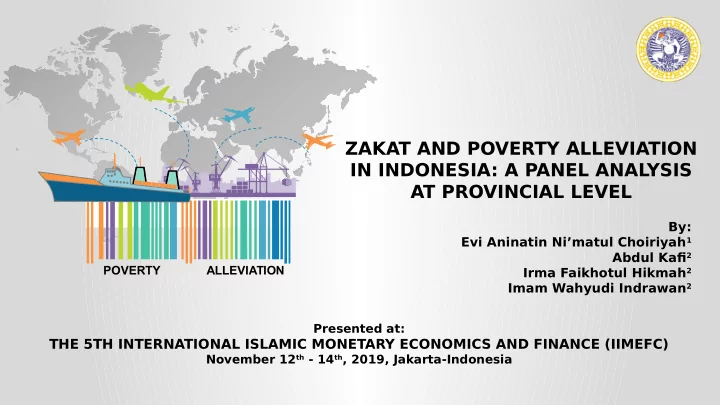

ZAKAT AND POVERTY ALLEVIATION IN INDONESIA: A PANEL ANAL YSIS AT PROVINCIAL LEVEL By: Evi Aninatin Ni’matul Choiriyah 1 Abdul Kaf 2 POVERTY ALLEVIATION Irma Faikhotul Hikmah 2 Imam Wahyudi Indrawan 2 Presented at: THE 5TH INTERNATIONAL ISLAMIC MONETARY ECONOMICS AND FINANCE (IIMEFC) November 12 th - 14 th , 2019, Jakarta-Indonesia
INTRODUCTION Measurement of Zakat Impact (IKB) Zakat Potential for Reducing Poverty Zakat as Islamic Philanthropy Reducing Poverty Determinant of Poverty Level
PROBLEM STATEMENT AND RESEARCH OBJECTIVE RESEARCH GAP - Previous studies related to the impact of zakat on poverty are Research still limited to normative Objective research. - This research is the fjrst research to discuss the topic in an empirical form. RESEARCH OBJECTIVE - The focus of this research is the macro approach related to the infmuence of zakat on poverty. - To measure the impact of IKB on the development of mustahik at the Previous provincial level in Indonesia. Studies - This study represents the impact of zakat by IKB.
METHODOLOGY POSSIBLE MODELS - Pooled OLS - Fixed Efgect Model (FEM) - Random Efgect ROBUSTNESS Model (REM) TEST 1 2 3 4 5 DIAGNOSTIC METHODS CONFIDENC TEST E LEVEL Panel Data - Redundant Fixed Analysis 95% (a=0,05) Efgects test - Breusch-Pagan LM test - Hausman LM test
VARIABLES P0 = Poverty Headcount Ratio Dependen Variables P1 = Poverty Gap Index P2 = Poverty Severity Index VARIABLES SOURCE OF DATA GRP = Gross Regional Product GINI = Gini Index Unemployment = Unemployment Independen Variables Ratio IKB = Indeks Kesejahteraan BAZNAS (BAZNAS Prosperity Index) SOURCE OF DATA - Statistics Indonesia. - Strategic Studies Center, Badan Amil Zakat Nasional of Indonesia (PUSKAS BAZNAS).
RESUL T
RESUL T - ANAL YSIS - Impactful zakat, proxied by IKB is only signifjcant to reduction of P0, the Poverty Headcount Ratio. - But, IKB is found to be insignifjcant to P1 and P2. - In the P0 model is already in line with normative view of zakat as a tool for poverty alleviation. - Zakat is insignifjcantly afgect the quality of poverty in terms of Poverty Gap Index and Poverty Severity Index. - The impact of zakat only benefjts for poor population that already close to poverty line, which signifjcantly reducing the poverty headcount ratio, i.e. reducing poor population. - Zakat does not afgect the deepest section of the poor population yet, which may cause poverty gap and poverty severity remains unafgected by stronger impact of zakat, measured by IKB.
CONLUSION AND RECOMMENDATION - Zakat has already played its role to reduce population living below poverty line. - IKB does not found to be signifjcantly afgect poverty gap and poverty severity, which Recommendation for means zakat in Indonesia has not 02 stakeholders in the future improve the quality of poverty at provincial level. CONCLUSION RECOMMENDATION - As this study indicates that Impactful zakat as indicated poverty gap can be reduced by 01 by higher IKB is strongly stronger economic growth, economic empowerment of the linked with reduction of poorest section of the society poverty headcount ratio. through zakat can be considered. - Future researches should include more time series and cross sections to obtain more comprehensive observations.
Recommend
More recommend